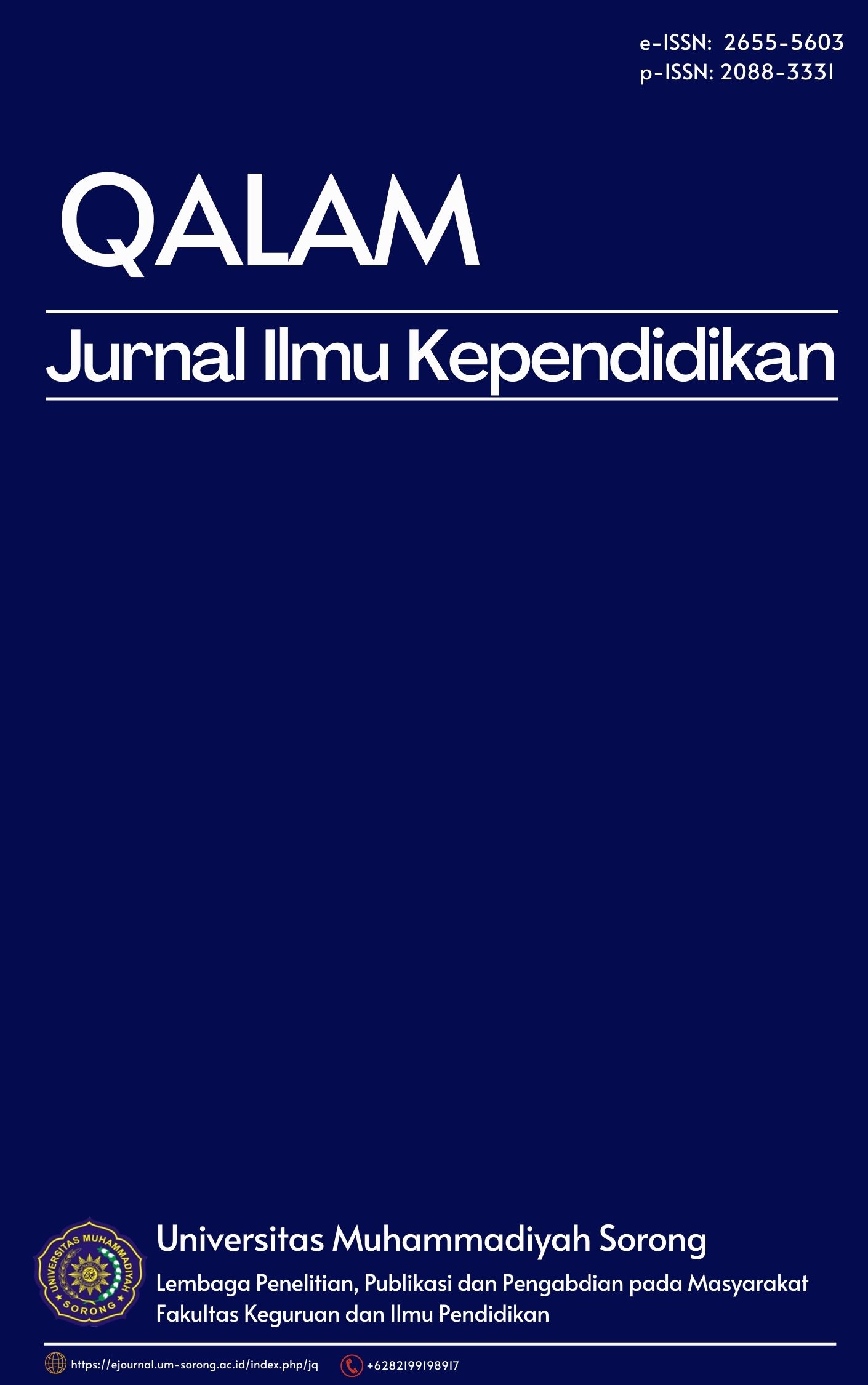Do Social Interactions with Peers Affect Student Identity?
DOI:
https://doi.org/10.33506/jq.v9i2.1105Keywords:
Social Interaction, Peers, Self-IdentityAbstract
This research is based on the observations and experiences of researchers, that at SMP Pawyatan Daha there are some students who are still doing things based on following along with friends, not based on themselves. For example, when a friend has a problem with a gang then triggers a fight, then his other friends will join in a fight with the intention of defending a friend even though they don't know what the problem is. This study aims to determine the effect of peer relations on self-identity. This study uses a quantitative research approach with comparative or ex-post facto causal techniques. The study population was 185, and the sample consisted of 47 research subjects of class VI students of SDN 26 Ampenan. Collecting data using peer questionnaire instruments and self-identity then based on the results of the distribution of questionnaires it was found that peers had a significant influence on the self-identity of grade VII students of SMP Pawyatan Daha 1 Kediri. Based on the results of the study using the product moment correlation test, the results obtained the value of r count ≥ r table or 0.295 ≥ 0.288. This means that there is an effect of peer interaction on the identity of class VII students of SMP Pawyatan Daha 1 Kediri. This result is supported by a simple linear regression test obtained by R Square with a result of 0.087. This means that the magnitude of the influence of peer interaction on self-identity is very weak.References
Bell, H. D., & McKenzie, V. (2013). Perceptions and Realities: The Role of School Psychologists in Melbourne, Australia. The Australian Educational and Developmental Psychologist, 30(1), 54–73. https://doi.org/10.1017/edp.2013.1
Berizzi, G., Di Barbora, E., & Vulcani, M. (2017). Metacognition in the e-Learning environment: A successful proposition for inclusive education. Journal of E-Learning and Knowledge Society, 13(3), 47–57. https://doi.org/10.20368/1971-8829/1381
Creswell, J. W. (2014). Research Design: Qualitative, Quantitative and Mixed Methods Approaches (4th ed.). SAGE.
Edwards, S., Nolan, A., Henderson, M., Mantilla, A., Plowman, L., & Skouteris, H. (2018). Young children’s everyday concepts of the internet: A platform for cyber-safety education in the early years. British Journal of Educational Technology, 49(1), 45–55. https://doi.org/10.1111/bjet.12529
Fischhoff, B., & Broomell, S. B. (2020). Judgment and decision making. In Annual Review of Psychology. SCITEPRESS. https://doi.org/10.1146/annurev-psych-010419-050747
Gil Madrona, P., & Samalot-Rivera, A. (2014). Improving Social Skills through Physical Education in Elementary 4th Year. American Journal of Sports Science and Medicine, 2(6A), 5–8. https://doi.org/10.12691/ajssm-2-6A-2
Guimarães, S., Lemos, I., & Nunes, C. (2011). Social Skills and Academic Achievement of Adolescent Immigrants in School Settings. International Journal of Developmental and Educational Psychology, 1, 115–120.
Hair, E. C., Jager, J., & Garrett, S. B. (2002). Helping Teens Develop Healty Social Skills and Relationships: What Research Shows about Navigating Adolescence. Child Trends Research Brief, 34(July), 1–8.
Kaya, İ., & Deniz, M. E. (2020). The effects of life skills education program on problem behaviors and social skills of 4-year-old preschoolers. Elementary Education Online, 19(2), 612–623. https://doi.org/10.17051/ilkonline.2020.692983
Lindelauf, J., Reupert, A., & Jacobs, K. E. (2018). Teachers’ Use of Psycho-Educational Reports in Mainstream Classrooms. Journal of Psychologists and Counsellors in Schools, 28(1), 1–17. https://doi.org/10.1017/jgc.2018.2
Lubberink, R., Blok, V., van Ophem, J., van der Velde, G., & Omta, O. (2018). Innovation for Society: Towards a Typology of Developing Innovations by Social Entrepreneurs. Journal of Social Entrepreneurship, 9(1), 52–78. https://doi.org/10.1080/19420676.2017.1410212
Mahmudul Haque, M. (2019). From Cognition, Metacognition to Autonomy: A Framework for Understanding Language Learning Dynamics. Arab World English Journal, 12(1), 207–222. https://doi.org/10.24093/awej/efl1.15
Mary McCarthy, N. (2010). Experiential Learning Theory: From Theory To Practice. Journal of Business & Economics Research, 8(5), 131–140.
Nita Novianti. (2017). Teaching Character Education to College Students Using Bildungsromans. International Journal of Instruction, 10(4), 255–272.
Smeets, D. J. A. (2017). Collaborative Learning Processes in Social Impact Bonds: A Case Study from the Netherlands. Journal of Social Entrepreneurship, 8(1), 67–87. https://doi.org/10.1080/19420676.2017.1299034
Soliemanifar, Behroozi, & Moghaddam, S. (2015). Role of Personality Traits , Learning Styles and Metacognition in Predicting Critical Thinking of Undergraduate Students. Bimonthly of Education Strategies in Medical Sciences, 8(1), 59–67.
Stephan, M. (2014). Sociomathematical Norms in Mathematics Education. In S. Lerman (Ed.), Encyclopedia of Mathematics Education (pp. 563–566). Springer Netherlands. https://doi.org/10.1007/978-94-007-4978-8_143
Sugiyono. (2016). Metode penelitian kuantitatif kualitatif dan R&D. Alfa Beta.
Susanto, A., & Farozin, M. (2018). Pengaruh konformitas, keterampilan sosial dan persepsi terhadap sinetron anak jalanan terhadap perilaku agresif. Harmoni Sosial: Jurnal Pendidikan IPS, 5(1), 93–104. https://doi.org/10.21831/hsjpi.v5i1.15001
Tanaka, Y., Nishi, Y., Nishi, Y., Osumi, M., & Morioka, S. (2017). Uncovering the influence of social skills and psychosociological factors on pain sensitivity using structural equation modeling. Journal of Pain Research, 10(7), 2223–2231. https://doi.org/10.2147/JPR.S143342
Tyaningsih, R. Y., Baidowi, & Maulyda, M. A. (2020). Integration of Character Education in Basic Mathematics Learning in the Digital Age. Atlantis Press, 465(Access 2019), 156–160.
Zsolnai, A., & Kasik, L. (2014). Functioning of Social Skills from Middle Childhood to Early Adolescence in Hungary. International Journal of Emotional Education, 6(2), 54–68. https://doi.org/10.1093/nar/7.1.15
Downloads
Published
How to Cite
Issue
Section
License
The article copyright is owned by the author and Qalam: Jurnal Ilmu Kependidikan

This work is licensed under a Creative Commons Attribution-ShareAlike 4.0 International License.




